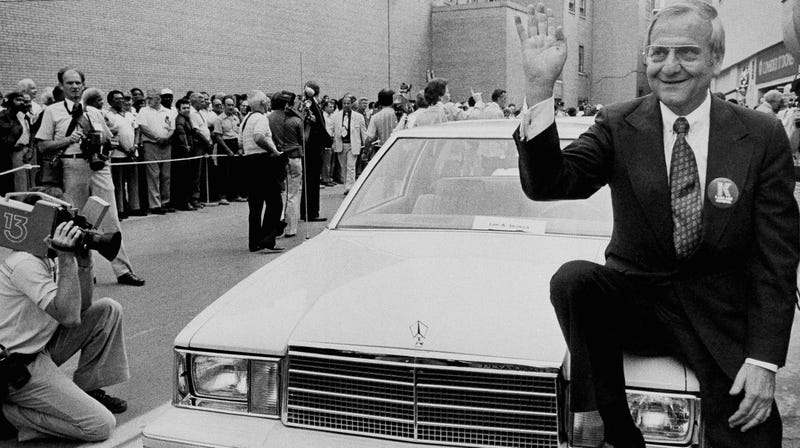
Lee Iacocca, one of the most influential auto executives in history, died yesterday at 94. Many of the obituaries and tributes credit Iacocca for his marketing genius, often simplified to the maxim that he knew what people want before they knew they wanted it, and the praise that rained down from politicians and the automotive press alike called him, among other things, “A Detroit car guy if there ever was one.”
Indeed, Iacocca was a consummate Detroit car man, leading Chrysler and Ford at critical times for the automotive industry as regulators began to wake up to both the environmental and safety issues widespread car use were having on society and the planet. And, like most other Detroit car men, Iacocca did not step up and usher his industry into a progressive age of righteous leadership. Instead, he got dragged, kicking and screaming.
“Mr. Iacocca’s legacy on safety and environment is not very good,” Dave Cooke, senior vehicles analyst for the Union of Concerned Scientists, wrote in an email. “American automakers have a multidecadal history of fighting against pretty much all regulations imposed upon the industry to protect the American people, and companies under his leadership were no different.”
Starting in the 1970s, Iacocca, then at Ford, was one of the most prominent voices opposing the Clean Air Act, which would have required the reduction of various vehicle emissions and improve fuel economy standards. In 1970, he warned the New York Times that such standards would force the entire auto industry to, quite literally, “stop producing cars in 1975” when the restrictions kicked in:
“No matter how much we spend and how many people we assign to the task,” Mr. Iacocca said, “we do not think we can do it by Jan. 1, 1975. Under this bill we would be directed to reduce all emissions by 90 percent even if nobody knows how to reduce emissions by 90 percent.”
Advertisement
Iacocca further warned that the Clean Air Act would, as a result of shutting down car production, “do irreparable harm to the American economy.” It’s true that shutting down the entire automotive sector would do irreparable harm to the economy, but it was utterly, profoundly false that the 1970 Clean Air Act would result in anything close to that. Nevertheless, he kept on this erroneous, fear-mongering line through 1973 even though automakers had already zeroed in on the catalytic converter as a solution to the problem (as Iacocca continued to falsely claim no solution had been found). In the end, U.S. automakers produced more passenger cars in 1975 than they did in 1970.
But the tables would turn. A decade later, then at Chrysler, Iacocca demonstrated the flexibility any good company man ought to have. By this point, Ford and GM had failed to properly invest in more fuel-efficient vehicles to abide by new federal standards, something Chrysler had done prior to Iacocca’s time. Ford and GM heavily lobbied the Reagan administration to roll back the standards to one they could meet. Iacocca, now on the right side of history purely by chance, essentially argued against his former self:
“GM and Ford said if they couldn’t sell big cars in order to meet [fuel economy standards] they would have to shut their plants and lay off people. Would GM shut a plant because instead of making $5,000 profit on a car they had to pay a . . . fine and only make $4,500? That’s mad; that’s crazy.”
Advertisement
Under the Reagan administration, the NHTSA unsurprisingly acquiesced over and over again to automaker demands, much to Iacocca’s chagrin. But it’s not as if he had some epiphany about the environmental and safety concerns of automobiles. He made the same business calculation as he had when leading Ford.
Even Iacocca’s highly publicized about-face on airbags is a lesson in the marketing cynicism of the modern age. Back at Ford in the 1970s, Iacocca was once again a leading voice against regulation, this time about mandating airbags, which save lives in crashes. Iacocca and Ford II personally lobbied Nixon to kill airbag regulations. It worked.
Advertisement
For 20 years, the auto industry fought regulation requiring airbags. Only until the late ’80s and early ’90s did federal requirements on airbags start to kick in, decades after safety experts had proved their value in saving lives.
Cynically, Iacocca became an airbag evangelist in the 1980s once at Chrysler. He did so not out of a newfound concern for human life, but because he began to realize, despite his oft-repeated remark that “safety doesn’t sell,” safety in fact does sell to some people, as European automakers had proved by including airbags as a selling point. But perhaps more importantly, the writing was on the wall for airbags, as the regulations were finally in place to take effect. Iacocca was not ahead of his time, but only ahead of other Detroit men, who were even further behind the times, in adapting airbags. He turned this slight advantage into a marketing pitch.
Advertisement
It never mattered to Iacocca if the regulations would have a positive impact on society or people’s health. All that mattered to him as an executive of a major automaker was whether it would, in his forecasting, have a positive impact on his corporation. Many Americans, particularly in Iacocca’s heyday, would have perceived no problem with this nakedly self-interested approach to business. Many Americans still don’t.
“Mr. Iacocca may have been revered as a visionary within the auto industry,” Cooke summarized, “but when it comes to the public’s health and welfare, he was always looking backwards.”













